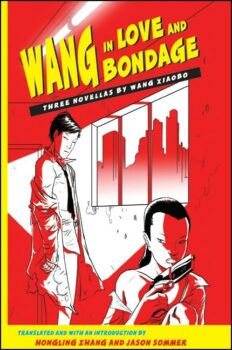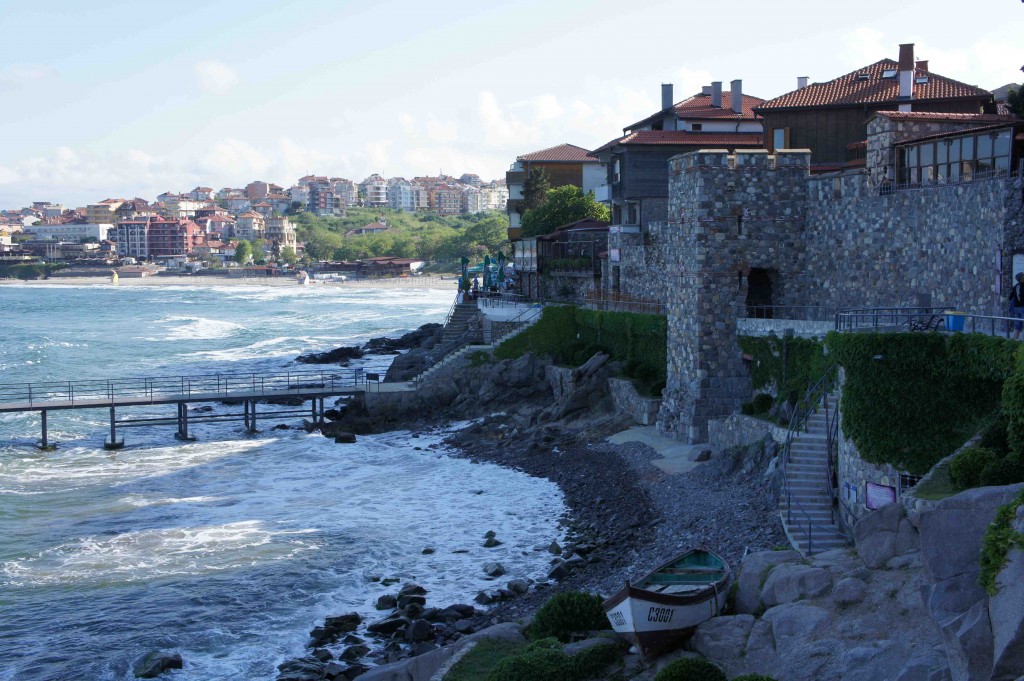
Along the Black Sea in Sozopol / credit Jeremiah Chamberlin
Each spring the Elizabeth Kostova Foundation selects five English speaking writers and five Bulgarian writers to participate in the Sozopol Fiction Seminar, which takes places in the tiny, historic town of Sozopol, Bulgaria, on the Black Sea. In 2009 I was lucky enough to be chosen as one of the fellows, along with now Contributing Editor Steven Wingate. That journey was chronicled in an essay entitled “Literary Life on the Black Sea,” which FWR published later that summer. The following year, we asked the English speaking fellows if they would be willing to compile a similar essay reflecting on their trip to Bulgaria to participate in 2010 seminar. Those individuals were Kelly Luce, Carin Clevidence, Charles Conley, and Paul Vidich. You can read about their experiences here.
In what has now become an annual tradition, FWR is happy to present the literary contribution’s from this year’s English speaking fellows, which we’ll publish in two parts this week:
Part One:
- “Meeting the Ambassador,” by John Struloeff
- “Embroidery and Home,” by Jane E. Martin
- “The Walk,” by Michael Hinken
Part Two:
- “Some Thoughts on Translation: A Conversation with Miroslav Penkov,” by Molly Antopol
- “Stealing Poetry: Why We Write and, Sometimes, Why We Don’t,” by Lee Romer Kaplan
I was also lucky enough to have been invited back to the 2011 seminar as a guest and panelist, for which I am grateful. We hope you enjoy this year’s retrospective!
Meeting the Ambassador:
by John Struloeff
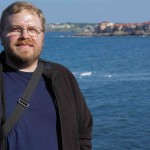 After more than twenty-four hours of travel from my home near Los Angeles, a wild taxi ride from the airport (what’s the word for ‘turbocharged’ in Bulgarian?), and only minutes after checking in to the Diter Hotel in Sofia, Simona Ilieva, the Assistant Director of the Elizabeth Kostova Foundation, which sponsors the Sozopol Fiction Seminars each year, called my room to say it was time to meet the U.S. Ambassador to Bulgaria. This was our first official event for the 2011 Seminar. I was honored by the invitation, of course, but I still hadn’t determined why an ambassador would want to meet me and a small group of emerging writers. So, red-eyed but exhilarated, I packed my satchel and met the early arrivals in the lobby.
After more than twenty-four hours of travel from my home near Los Angeles, a wild taxi ride from the airport (what’s the word for ‘turbocharged’ in Bulgarian?), and only minutes after checking in to the Diter Hotel in Sofia, Simona Ilieva, the Assistant Director of the Elizabeth Kostova Foundation, which sponsors the Sozopol Fiction Seminars each year, called my room to say it was time to meet the U.S. Ambassador to Bulgaria. This was our first official event for the 2011 Seminar. I was honored by the invitation, of course, but I still hadn’t determined why an ambassador would want to meet me and a small group of emerging writers. So, red-eyed but exhilarated, I packed my satchel and met the early arrivals in the lobby.
In my delirium I only recall hazy images from that first walk through the capital city to the ambassador’s residence: cobblestone streets, intersections that angle oddly in the Old Europe style so that you’re always rounding a building’s corner, people crossing streets and brushing past my shoulder, gray stone and old trees, the whir and bell of a trolley passing behind, a large park with an enormous Soviet Army monument darkly splitting the sky between trees. It was a rejuvenating walk, the weather warm, a nice breeze, blue sky.
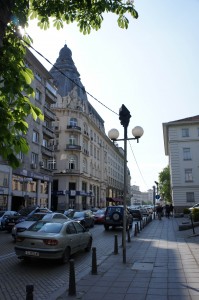 We eventually stopped in front of two men wearing black suits and sunglasses. The embassy security detail. Beside them, an iron gate led through a high cement wall into a courtyard. Inside was what seemed like a small park, with a manicured lawn, a scattering of shade trees, a few benches and small tables. Facing the yard was a large manor house, shades drawn from the long span of windows to show artwork hanging on the walls inside.
We eventually stopped in front of two men wearing black suits and sunglasses. The embassy security detail. Beside them, an iron gate led through a high cement wall into a courtyard. Inside was what seemed like a small park, with a manicured lawn, a scattering of shade trees, a few benches and small tables. Facing the yard was a large manor house, shades drawn from the long span of windows to show artwork hanging on the walls inside.
James Warlick, the ambassador, greeted us right away with a smile and a handshake, followed by a woman with a tray of cold water and cola. Mr. Warlick was a pleasant man in his fifties who had served as Principal Advisor to Paul Bremer in Baghdad, as well as the Counsel General in Moscow. He was well dressed in a pressed white shirt, a tie, and slacks, and he seemed very interested in what we wrote, what the life of a writer was like, what brought writers together in the U.S. He talked about how his own writing was storytelling, but in a different way, and he was curious about how we looked at story writing. I began to see how an ambassador worked – listening and connecting.
The conversations in the courtyard grew, with laughter and the greeting of old and new friends. Soon there were more than a dozen of us, and so Mr. Warlick suggested we gather in a circle to introduce ourselves. Elizabeth Kostova, fresh from a television interview and dressed smartly in a skirt and jacket, welcomed us all and said how much she was looking forward to the workshops and discussions in the week to come, and the rest of us followed: Angela Rodel from Southern California who had married a Bulgarian and has been translating Bulgarian to English for over fifteen years; Svetlozar Zhelev, the publisher of the biggest publishing house in Bulgaria; Ivan Landzhev, a screenwriter for Bulgaria’s top TV show; Jane E. Martin from Montreal who wrote tech manuals and short stories; Ivan Dimitrov, a Bulgarian Fellow from last year who just wanted to continue the discussion; Jeremiah Chamberlin, the head of the English Department Writing Program at University of Michigan; me, the director of creative writing at Pepperdine University in California.
As the introductions continued, I began to recognize the experience and breadth of professional talent that had been gathered here. I had come to Bulgaria to continue my work on a biographical novel about the spiritual transformation of Leo Tolstoy, with the hope of receiving insights from others who cared about the literature of this part of the world. I wanted to hear what my work sounded like from a person in another culture and language, to hear from people as serious about this pursuit as I was. More than anything, I think, I wanted to see if my work could engage writers and publishers in another part of the world. With the conclusion of the introductions, I was excited to begin this conversation – to be heard as an artist, but also to listen.
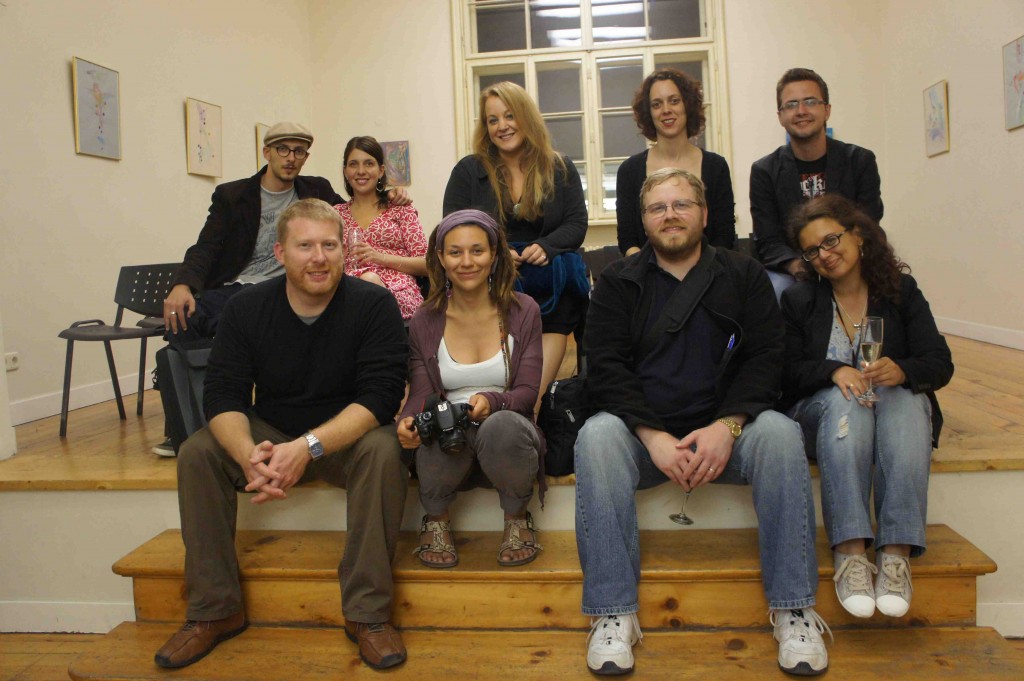
2011 Sozopol Fiction Seminar Fellows. In back, from left: Ivan Landzhev (BG), Molly Antopol (US), Lee Romer Kaplan (US), Jane E. Martin (CA), Rayko Baychev (BG). Front row, from left: Michael Hinken (US), Yana Punkina (BG), John Struloeff (US), Petja Heinrich (BG). Not pictured: Paullina Petrova (BG). Photo credit Jeremiah Chamberlin
Three days later, when workshops began at the seaside town of Sozopol, where we’d spend a week immersed in sharing our work and listening to lectures and attending readings, I’d find those other readers. Not just in the English-speaking fellows who had come from the US and Canada to attend the seminar, but also during our first of two public readings, when a selection of the novel, which had been translated by Angela Rodel, would be read in Bulgarian by my roommate, Ivan Landzhev. Each of us was paired – one English-speaking fellow with one Bulgarian fellow – so that all of us had the chance to read our own work, and then to hear that same work in the other language. I had never had that experience before – not only to have a professional translator carefully translate my writing, but then to have another person read it just as carefully. My novel opens with a very intense and graphic scene about the death of one of Tolstoy’s neighbors, and it was fascinating to hear Ivan’s Bulgarian intonations and to see the rapt attention of the audience. In that moment, the writing was my own, but curiously not my own. I know very little Bulgarian, yet I could see the connection that was growing between the audience and my work as Ivan read. And the other short stories and novel excerpts were all vivid and so well written – I really didn’t expect how memorable and meaningful this part of our stay would be.
But back at the ambassador’s house, this was still to come. And when we were then invited into the ambassador’s home, where there was an array of paintings and sculptures from around Bulgaria, we started the first of many conversations that would take place over the next week. Within an hour I had gone from weary and feeling very much on the other side of the Earth, to feeling the openness and friendship growing in this circle, set by Elizabeth’s incredibly warm presence. We began to joke and tell our stories and open our lives and art to one another. Within a week, this group would become a close-knit and beautifully complex mix of artists and publishers and translators from a variety of different cultures, and I would learn from them more than I expected – about the art of translation, about the complicated forces in the international publishing world – and I would find true friends. By the end of my stay, it was clear why an ambassador would want us to visit his home, and also why Elizabeth had created her foundation: because of the power of art to connect us.
Embroidery and Home:
by Jane E. Martin
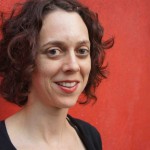 Each day during the Sozopol Fiction Seminars, after our morning fiction workshop and before the afternoon lecture, I visited a woman selling traditional Bulgarian embroideries in Old Town. I nearly walked past her the first day. I was headed toward the docks and she was the last artisan before the pathway to the water. Her work stood out—the embroideries hung on clotheslines and blew in the breeze. As well, they were beautiful. I paused briefly, only for a beat or two, because I was determined to get to the water. But that was enough. The old woman rose from her chair and crossed the walkway. She moved easily, lightly—though, I wouldn’t have guessed that she could when she’d been sitting.
Each day during the Sozopol Fiction Seminars, after our morning fiction workshop and before the afternoon lecture, I visited a woman selling traditional Bulgarian embroideries in Old Town. I nearly walked past her the first day. I was headed toward the docks and she was the last artisan before the pathway to the water. Her work stood out—the embroideries hung on clotheslines and blew in the breeze. As well, they were beautiful. I paused briefly, only for a beat or two, because I was determined to get to the water. But that was enough. The old woman rose from her chair and crossed the walkway. She moved easily, lightly—though, I wouldn’t have guessed that she could when she’d been sitting.
Over the next ten minutes, she watched me examine her work more closely. I touched one piece, admired the stitching and patterning of another. She had a lot to say about each, in Bulgarian, a language I don’t understand, and I had many words of praise —“So beautiful”; “I love this one”—which, though she spoke no English, she did seem to understand. She folded one of the embroideries I’d been looking at and put it in a plastic bag for me, as though I’d agreed to buy it. I laughed. She pulled out a weathered piece of cardboard on which the numbers 1 to 100 were handwritten. She pointed to a number, a price, and I pointed to a smaller number. She then referred me to the elaborate lacing on her work. I felt like an ass. I’d also felt like an ass a few days before, when I’d learned that a taxi driver had charged me twice the normal rate for a ride from the airport to downtown (“the English speaker’s tax,” a new Bulgarian friend suggested). And, in the end, decisions make me nervous, so I couldn’t buy an embroidery without thinking more about whether I should. “I’ll come back,” I said to the old woman. “I’ll come back.”
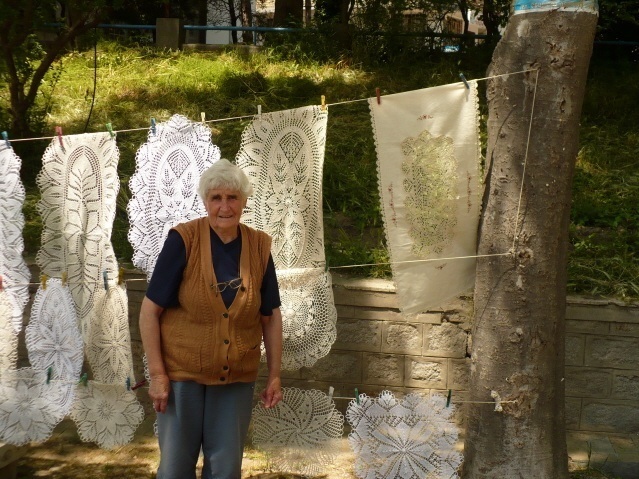
Woman selling embroideries in old town of Sozopol / Photo credit Jane E. Martin
Later that day, as we gathered inside an old school that had been converted into an art gallery, where our afternoon lectures took place, my Bulgarian friends told me that the price the woman had requested was reasonable. They also told me that in the past, many such women sold embroideries on clotheslines in Old Town. Now that Sozopol was becoming increasingly developed, these women were scarce. They had been replaced by shops and cafés, by street vendors selling crafts one might find in any city of the world. I wanted to run to the old woman right then. I wanted to give her the price she’d asked for, to show her, through decisiveness and lack of protest, that her work was worth this amount, worth much much more. I hoped she would be in her spot the following day. “She will be,” my friends told me.
The lecturer that afternoon was the Bulgarian-born German author Ilya Troyanov. He told us about Sir Richard Burton, a British explorer he had always admired, who had once taken a particularly momentous journey. Troyanov had retraced his hero’s steps so that he could write about the journey in his novel The Collector of Worlds. Back in Montréal, where I’ve lived for nearly two years now, I’d been doing my own retracing. My grandmother lived in a small farming village before she and her family—along with a million other Québécois—left Canada for the United States for a better life. My six other great-grandparents had done the same, years earlier. I hadn’t known much about French-Canadian history until recently—or that marveling openly over its more polarizing or debated events, at parties, on the metro, at work, was not always a popular thing to do in Canada. As a French-Canadian whose first language was English, I hadn’t yet figured out how to integrate comfortably into any particular community in my new home.
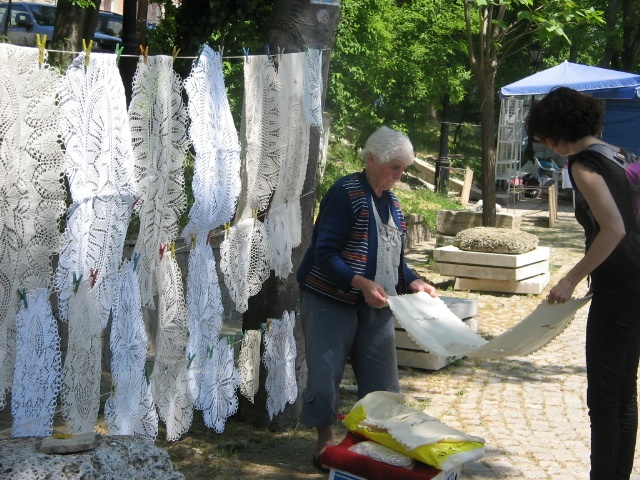
Selecting embroidery in old town of Sozopol / Photo credit Michael Hinken
The next day, I bought an embroidery from the old woman. The piece I’d really had my eye on during my previous visit, however, was gone. I tried to ask—through histrionic gestures—whether it had been sold. “Come back,” she said to me, remembering my words from the day before. “Come back.”
I did return again, the next day, with two other American fellows. The old woman sat in the shade of a building, working on an embroidery as we approached. She looked up and in an instant was beside us. “Zdrasty,” I said to her. “Hello.” From a box that lay before the clothesline, she removed the piece that I’d been especially drawn to the first day. I bought it, and another. My friends bought embroideries, too. The woman clasped her hands together and laughed. I held a hand out to her and she pressed it between her two. “I’m going to teach you Bulgarian,” she told me. (My friends, Russian speakers, were able to translate for me.) We stood there, the old woman and I, my hand between hers, as I repeated the Bulgarian words she wanted me to know: sutrin, vecher, nosht, dovizhdane—morning, evening, night, goodbye.
I didn’t want to leave her. I loved that she understood a different time and life and that for hours each day, she sat alone and quietly reconstructed part of that world in her work. I loved that she persisted amidst unexpected shifts—even though occasionally, perhaps, she felt like an outsider. And that despite this, she was warm, and seemed happy. This old woman made me feel welcomed.
And so I was sad to leave her company, but comforted that I would bring an embroidery or two—some representation of her vision—back home with me to Québec.
The Walk:
by Michael Hinken
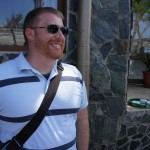 I had been in Sozopol for three days, in Bulgaria for four, and my sleeping habits had yet to normalize. On the morning of that fourth day, I awoke early, listening to the odd, pained cries of the seagulls outside the balcony, their calls sounding vaguely feline at times, sometimes vaguely human. Realizing I was wide awake, I decided to get up and walk into the city to mail some postcards and stick my feet in the Black Sea before embarking on a day of workshops, roundtables and seminars.
I had been in Sozopol for three days, in Bulgaria for four, and my sleeping habits had yet to normalize. On the morning of that fourth day, I awoke early, listening to the odd, pained cries of the seagulls outside the balcony, their calls sounding vaguely feline at times, sometimes vaguely human. Realizing I was wide awake, I decided to get up and walk into the city to mail some postcards and stick my feet in the Black Sea before embarking on a day of workshops, roundtables and seminars.
This morning, with the early sunlight on the tops of buildings and nobody about, it’s pretty quiet. A long, short-legged red dog pauses in the middle of the sidewalk to sniff something, then moves on. I think I’ve seen that dog every day since I’ve been here, definitely the day before, when one of the writing fellows, John, and I made our way down to the beach. In the plaza past the post office, women in orange reflective vests sweep the cobblestones with half brooms. The souvenir stands are setting up. In the plaza, under a façade with the city’s name and some lines—probably historical—engraved below in Cyrillic, there’s a bench built into the wall. Yesterday a dozen or so men sat in row, talking or just sitting in the afternoon sun with their canes and hats and slacks rising above their old shins. “There’s the city council,” John said. “The old guard.” I added. Now the bench is empty.
I walk through the park, past the ancient church, past the fountain of many small brown smooth stones the size of golf balls, down the steps and to the sea. There’s that crystalline light that you get by the water, that tang on the breeze. And below, on the beach, rows of metal contraptions like skeletons of beach umbrellas, waiting, I suppose, for some canvas to be thrown over them and make them umbrellas. I walk between the rows down to the water, take off my shoes, and wade in. Not bad. I thought it would be colder. I walk along where the water joins the shore. I meet a jogger coming the other way, an old man with ruffled, swept-back hair. He’s stringy and tanned and wearing the smallest yet somehow the saggiest bathing suit I have ever seen. He jogs past, a gold disc on a chain bouncing in his sparse, fluffy gray chest hair. I nod at him as he passes, and think, here’s a guy who runs on the beach every day.
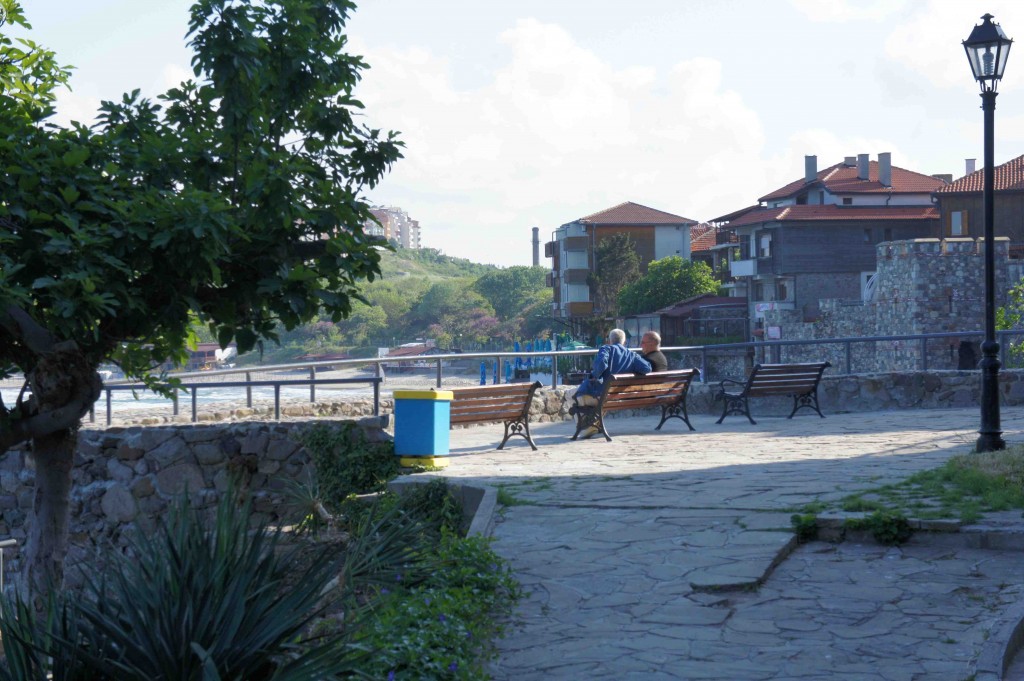
Approaching the Beach in Sozopol / credit Jeremiah Chamberlin
Farther on, I sit on a sofa pushed against the concrete wall of an empty concession stand and make some notes on the past few days, the discussion of translation from the day before, ideas from my workshop, things I want to remember. After a few minutes, I look up and there’s the old guy. He’s standing on a rock in the shallow surf doing these stretches, or maybe poses, some improvised personal version of Tai chi. This goes on for a while—this little bronzed guy doing exercises in the sea. I have one of those telescoping moments: I am sitting on a red sofa, on this beach, near the Black Sea, in Sozopol, in Bulgaria, in Europe. I am watching a guy on a rock. Then he jumps. But it’s not some ordinary, point-A-to-point-B jump. Not at all. It’s something graceful, suspended. He catches some air. The act seems both spontaneous and performed—as if it was supposed to look like something, but only he knew what. And then he’s on the ground running again.
As I walk back from the beach, past an open-air bar called Captain Jack’s where “Shine on You Crazy Diamond” blares from the speakers, I am thinking of something one of my professors said years ago. It was a simple line and it has stuck with me; it explains travel and probably the impulse to the travel narrative: We travel to see things we can’t see at home. Home for me is Peoria, Illinois, where men grow old in the air-conditioned cabs of farm machinery or behind desks at Caterpillar, Inc., and where there are no beaches to run on, just flat miles of soybeans and corn. The small odd moment of the old guy on the rock is something I had to leave home to see, which may explain why I keep thinking about it. I have no idea why the guy made that little leap, or why it made an impression on me.
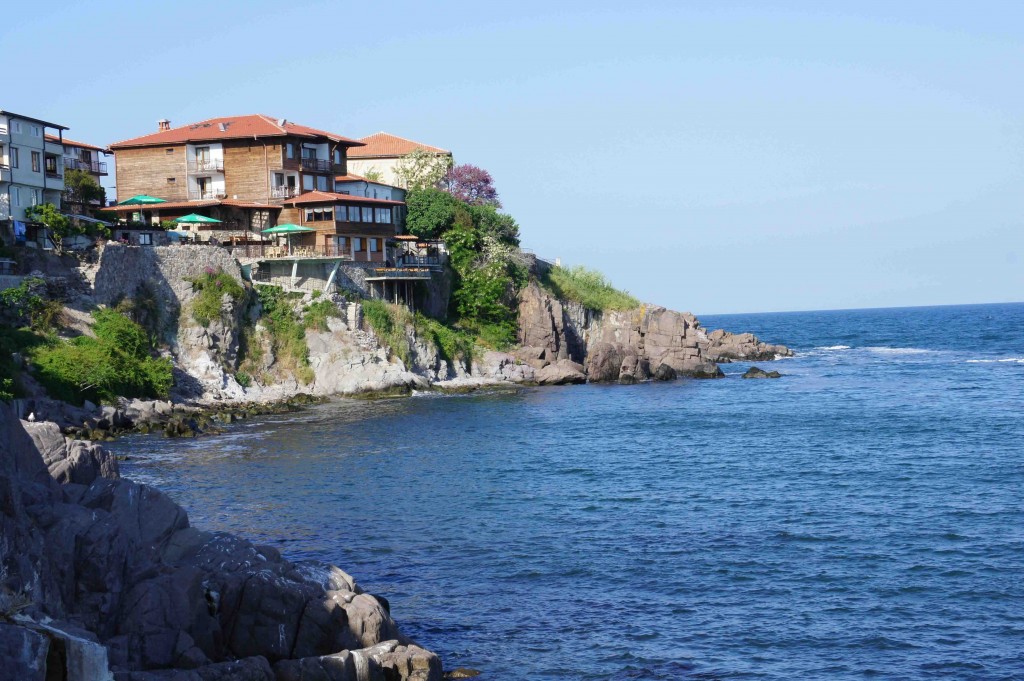
Overlooking the Sea in Sozopol / credit Jeremiah Chamberlin
Later that day, at his reading and craft talk, the writer Rana Dasgupta would speak about “writing from ignorance.” This impulse was, in part, what led him to write his second novel, Solo, which is set in Bulgaria. “Aside from Albania,” he said, “Bulgaria is the least known country in the European Union. And not only is it the least known, but you are told by inference through a general lack of its coverage in the global media, that there is nothing there worth knowing about.”
In his discussion, Dasgupta went on to draw a distinction between a culture of experts and a culture of ignorance, suggesting that writers ought to question established knowledge, the knowledge of the experts. “Established knowledge builds and supports institutions. To challenge established knowledge is to be ignorant, and this position of ignorance about the world is a much more interesting place from which to write.”
That a writer should write from ignorance rather than authority is a claim that may be hard to accept at first. In fact, a murmur rose from the writers and translators and editors in the room that evening when Dasgupta made his assertion, and one person, during the Q&A that followed, even pressed him further on this point. As much as the idea seems counterintuitive, something about it resonated with my thoughts about writing and on traveling.
I thought first of advice from Anne Lamott’s fun and wise book Bird by Bird: Some Instructions on Writing and Life. In it, she says that somewhere along the line we adults lose the capacity to inhabit that worldview most of us have as children, which amounts to, essentially, “Wow, look at that crazy bird” and “check out that humongous tree.” Being young, lacking experience with birds and trees and the world, we were constantly in wonder at the most ordinary things—pigeons and cranes and seagulls, ginkgos and cedars and huge spreading oaks. Lamott suggests that writers try to recapture that child’s-eye view, to push through the dulling of the senses that comes with encountering your nine hundredth pigeon and really see that iridescent rat-with-wings.
Lamott’s idea of recovering the child’s eye links up with the concept of defamiliarization put forth by twentieth century Russian critic Viktor Shklovsky in the essay “Art as Technique.” In it, he asserts: “Habitualization devours works, clothes, furniture, one’s wife, and the fear of war. ‘If the whole complex lives of many people go on unconsciously, then such lives are as if they had never been’ (Tolstoy). And art exists that one may recover the sensation of life; it exists to make one feel things, to make the stone stony.”
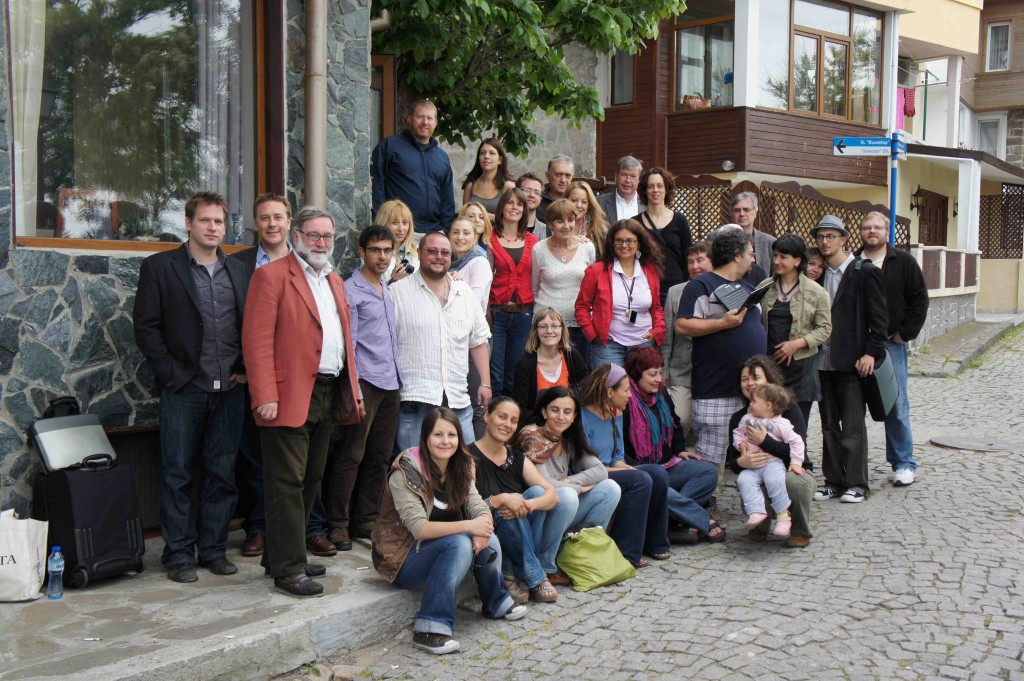
2011 Sozopol Fiction Seminar Participants / credit Jeremiah Chamberlin
To make that stone stony, writers must set aside the abstractions of repetition and experience and see it anew, make it new. In essence, as Dasgupta suggested, writers need to be willfully ignorant of not only the established knowledge of institutions—media, governments, history—but also that established, accumulated knowledge stored in oneself.
And what better way to do this than travel? As an American in Bulgaria, largely ignorant of the culture, the language, I came into contact with defamiliarized moments constantly, moments when the familiar became strange, whether it was hearing Pink Floyd outside Captain Jack’s or watching the Tai chi guy leaping into the surf. To be abroad is to be surrounded by the strange, to be a stranger. This ignorance and strangeness comprise that which is so fundamental to art, to writing, and that is the ability to cut through the tyranny of the everyday, the blunting of our world rendered by familiarity, and to see as if for the first time.
Editor’s Note: Part II of this year’s Sozopol coverage continues with Molly Antopol’s conversation with Bulgarian author Miroslav Penkov and Lee Kaplan Romer’s meditation on writing as an act of defiance and grace.
Contributors:
 John Struloeff grew up in the mountainous rainforests of northwestern Oregon. His debut poetry collection, The Man I Was Supposed to Be, was published by Loom Press in 2008, with individual poems in The Atlantic Monthly, The Southern Review, Prairie Schooner, ZYZZYVA, PN Review, and elsewhere. His awards include a Stegner Fellowship from Stanford University, an NEA Literature Fellowship, and both the Weldon Kees and Tennessee Williams Scholarships. He has taught at Stanford University and the University of Nebraska-Lincoln where he received both his MA and PhD in English. Currently he directs the creative writing program at Pepperdine University in Malibu, California.
John Struloeff grew up in the mountainous rainforests of northwestern Oregon. His debut poetry collection, The Man I Was Supposed to Be, was published by Loom Press in 2008, with individual poems in The Atlantic Monthly, The Southern Review, Prairie Schooner, ZYZZYVA, PN Review, and elsewhere. His awards include a Stegner Fellowship from Stanford University, an NEA Literature Fellowship, and both the Weldon Kees and Tennessee Williams Scholarships. He has taught at Stanford University and the University of Nebraska-Lincoln where he received both his MA and PhD in English. Currently he directs the creative writing program at Pepperdine University in Malibu, California.
 Jane E. Martin earned an MFA in Creative Writing from the University of Michigan, and before that, an MA in Drama from Tufts University. Her work has appeared or is forthcoming in the Massachusetts Review, Michigan Quarterly Review, The Southern Review, and Prairie Fire (Canada). She was recently a Fulbright Scholar at McGill University and currently lives and works in Montréal.
Jane E. Martin earned an MFA in Creative Writing from the University of Michigan, and before that, an MA in Drama from Tufts University. Her work has appeared or is forthcoming in the Massachusetts Review, Michigan Quarterly Review, The Southern Review, and Prairie Fire (Canada). She was recently a Fulbright Scholar at McGill University and currently lives and works in Montréal.
 Michael Hinken has taught English in the Russian Far East, covered municipal news in central Illinois, and now teaches composition and creative writing at the University of Michigan, where he received an MFA in Creative Writing in 2004. He was a fiction fellow at the Fine Arts Work Center in Provincetown during 2007-08. His short stories have appeared or are forthcoming inthe Tampa Review, River City, West Branch and Third Coast, and his essays have appeared in the Michigan Quarterly Review, Elysian Fields Quarterly, and the Peoria Journal Star. He is working on a short story collection and a novel. He is also a contributor to Fiction Writers Review.
Michael Hinken has taught English in the Russian Far East, covered municipal news in central Illinois, and now teaches composition and creative writing at the University of Michigan, where he received an MFA in Creative Writing in 2004. He was a fiction fellow at the Fine Arts Work Center in Provincetown during 2007-08. His short stories have appeared or are forthcoming inthe Tampa Review, River City, West Branch and Third Coast, and his essays have appeared in the Michigan Quarterly Review, Elysian Fields Quarterly, and the Peoria Journal Star. He is working on a short story collection and a novel. He is also a contributor to Fiction Writers Review.
The 2012 Sozopol Fiction Seminar: May 24 – 27
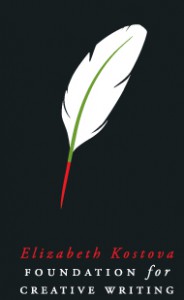 Ten scholarships, valued at approximately $1,600 each, will be available to attend the 2012 Sozopol Fiction Seminars in Sozopol, Bulgaria. Funding will support five fiction writers working in English and five fiction writers working in Bulgarian. Scholarships will cover tuition fees, room and board, in-country transportation, and 50% of international travel expenses. Writers of any nationality are eligible to apply.
Ten scholarships, valued at approximately $1,600 each, will be available to attend the 2012 Sozopol Fiction Seminars in Sozopol, Bulgaria. Funding will support five fiction writers working in English and five fiction writers working in Bulgarian. Scholarships will cover tuition fees, room and board, in-country transportation, and 50% of international travel expenses. Writers of any nationality are eligible to apply.
- Application deadline is March 7, 2012.
- For more information, or to apply, please visit the EKF Website.
- 2012 faculty members: Elizabeth Kostova (US), Barry Lopez (US), Deyan Enev (BG), and Krassimir Damianov (BG/ES).

